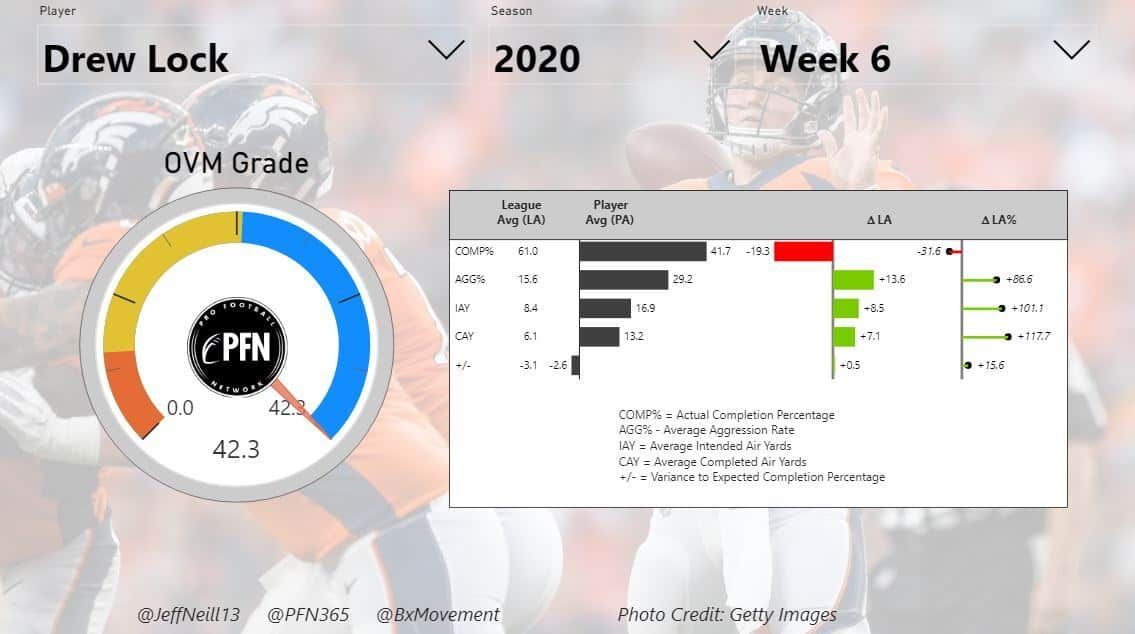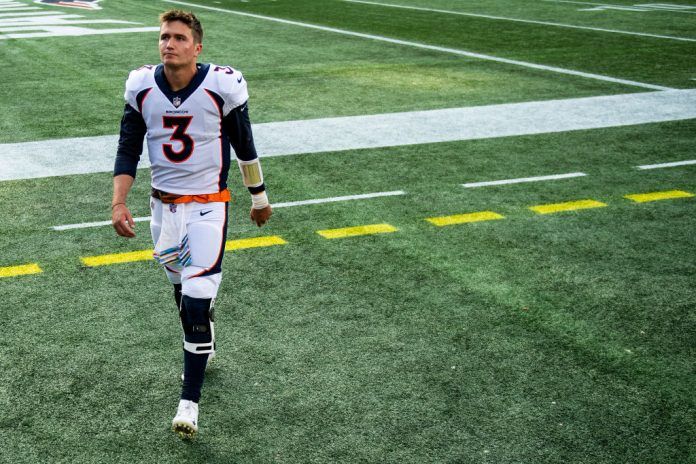Drew Lock finally returned from an injury to his throwing shoulder on Sunday against the New England Patriots, and his stats were somewhat of a mixed bag on the surface. On the positive end, the Denver Broncos were able to pull off the upset despite missing several key players, including Melvin Gordon and Noah Fant. In a vacuum, winning is all that matters, so in theory, I could just end the article here.
Of course, in reality, player performances carry over from game to game, which is what makes post-game analysis valuable. Lock’s statistics in his return look terrible on the surface. He threw for a paltry 189 yards and tossed two fourth-quarter interceptions that, were the Patriots offense even vaguely competent, might have allowed them to make a comeback. However, appearances can be deceiving, and there was a lot more to Lock’s performance than initially meets the eye. According to the statistics, he actually provided an exceptional amount of value to the Broncos offense.
Using the OVM to better evaluate Drew Lock’s stats
In order to accurately assess Lock’s performance against New England, let’s use PFN’s Offensive Value Metric (OVM), which measures how important a player was to their offense. On Sunday, the OVM gave Lock a grade of 42.49, making him the most valuable quarterback to his team, and one of the most valuable players in the entire NFL during Week 6.
Perhaps more significantly, that grade represents a dramatic improvement over Lock’s only other grade of the season, a 14.67 in Week 1. It’s unreasonable to try and draw long-term conclusions from merely a pair of games, but it is safe to say that this game was a massive step in the right direction from the young quarterback.
Interceptions are not just a quarterback stat
You are probably wondering how Drew Lock could have graded so highly despite having such poor box score stats. Well, for starters, it is essential to remember interceptions are not counted against a quarterback in their OVM grades. That is because, without being inside the huddle, we don’t know what each player’s responsibilities were on any given play. As such, it is impossible to accurately assign blame for interceptions. We can use Lock’s turnovers from Sunday as examples. From an outside perspective, it appears that the second of the two was likely his fault. He threw the ball deep downfield into double coverage, which is generally an ill-advised decision unless the situation is truly desperate.
Related | QB Power Rankings 2020 Week 7: Matt Ryan, Deshaun Watson out to reclaim seasons
The first interception, on the other hand, is harder to determine responsibility for. Lock’s pass was well behind Tim Patrick, his intended target. It is entirely possible that Lock simply misfired, as he was prone to similarly inexplicable mistakes in college. However, it could also be the case that Patrick was supposed to turn back for the ball sooner. Had he done so, he would have been in a position to at least contest for the catch.
On comeback routes, quarterbacks will often throw the ball before the receiver starts to turn so that it will arrive with perfect timing. If the receiver never turns or turns too late, and the defender reads the play, it can result in an easy interception. If that is what happened on Sunday, the person to blame for the interception would be Patrick because he wasn’t where he was supposed to be when Lock released the ball. Whether that was actually the case is impossible to say without looking at Denver’s playbook, but it is not an unrealistic scenario.
Using advanced stats to explain Drew Lock’s high OVM grade

Still, even with OVM discounting interceptions, it doesn’t explain why Lock’s grade was so high against New England all by itself. After all, there were several other metrics on which Lock failed to perform. The one that stands out the most was his abysmal completion percentage of just 41.7%. You likely don’t need me to tell you how terrible that is, although there is some further context that needs to be mentioned here. According to the NFL’s advanced statistics, that completion percentage was 2.6% lower than it should have been.
On the one hand, this reflects poorly on Lock, as it shows that he performed at a level slightly below that of an average NFL quarterback given his situation. However, the difference is relatively small, indicating that, even if Lock was performing at an average level, his completion percentage would still have been incredibly low.
Related | Bailey’s First Round 2021 NFL Mock Draft
There are a few reasons for that, and these are the areas in which Lock performed well above the league average. For starters, although the Patriots offense looked dreadful on Sunday, overcoming their defense is still a daunting task. They blanketed the Broncos receivers, forcing Lock to throw into tight coverage 29.2% of the time, the second-highest percentage of the week.
When faced with such difficulties, one might expect a quarterback to resort to shorter, safer passes. Lock did the exact opposite, throwing the ball an average of 16.9 yards downfield against New England, further than any quarterback in a single game so far this season. That is a bold choice, to say the least. Lock looked at receivers that couldn’t get open against dangerous opposition and responded by constantly firing the ball downfield. It didn’t always result in success, but it was a valiant effort nonetheless.
Drew Lock could be the future for the Broncos
Despite the Broncos upset victory and Lock’s success, Denver still seems unlikely to be a threat come playoff time. They’ve had a number of critical injuries, and they still need to play the defending Super Bowl champion Kansas City Chiefs twice this season. Even with Lock performing at a high level, it is difficult to envision the team going far this season. That said, if Lock continues to play well going forward, the Broncos will be far more confident that he can be a legitimate franchise quarterback, the team’s first since Peyton Manning’s early years in Denver. And that would ultimately be far more important than the team’s overall success in a season crippled by injury.
Lucas Ellinas is a writer for Pro Football Network. You can follow him on Twitter @Lucas_Ellinas.

